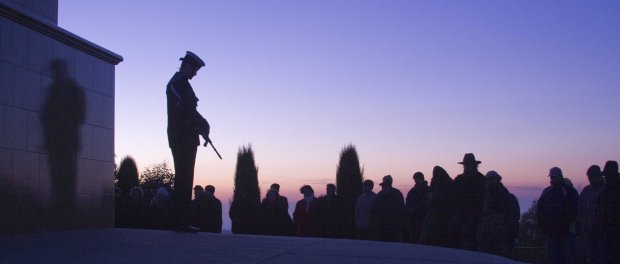I’ll be marching on Anzac Day. Proudly. I’ll be marching next to my grandfather, a Korean War veteran who fought bravely in the Battle of Kapyong. It is a humbling experience. Marching towards the sacred shrine, a chorus of grateful applause from glassy eyed men, women and children, venerating the sacrifices of men and women from generations past. It never fails to send a tingle down the spine, such is the energy of the day.
Anzac Day is, rightly, a day of remembrance. It is a day we are reminded of the bravery of men and women, and the sacrifices they made for what they believed was right.
It is not, however, a celebration of nationhood. In some circles that is what it has become. The story of Anzac has been appropriated into something mythical. Increasingly, in our political and social commentary, Anzac has become a nostalgic homage to a national creation story used to reinforce nationalistic values. Popular thought champions the idea that the Gallipoli landings ushered the birth of our young nation, giving it a sense of itself previously living in the shadow of the British Empire.
The militirisation of Australia’s history conveniently filters out the reality that World War One did not unite us, but divided us as a nation. 62,000 dead soldiers shattered families and broke communities, and the war left many surviving veterans broken men upon return.
Prior to World War One, Australia had been engaged in a nation-building project since Federation in 1901, led by a string of astute leaders. The steady development of Australia’s political and social fabric was interrupted by unprecedented bitterness and division after 1914.
Prime Minister Billy Hughes left office in acrimonious circumstances, unable to convince the nation of the need for conscription. As journalist and historian Paul Kelly wrote: “The nature of Australia’s pre-1914 political life and competition was transformed as society became more polarised, families nursed their grief, and tensions between conservatives and radicals assumed new intensity.”
A generation of men was lost, and a great number of wounded veterans failed to secure work due to sustained injuries. The key premise of Anzac is that nations are made in war, but if anything, the blood spilt on the shores of Gallipoli and on the Western Front served to damage our nation more than enhance it. The nation building project was eclipsed by the bloody drama of conflict.
It is difficult to mount the argument that Gallipoli spawned the Australian birth, when in reality, Australia was fighting an imperialist war for Great Britain, and was being used for cannon fodder at that. Ironically, the nation building narrative fits neatly with Turkey, who after World War One became a unified Republic under the leadership of Kemal Ataturk, the man who led Turkish forces on the Gallipoli peninsula.
No doubt, the virtues of courage, bravery and mateship are true of Australian soldiers and is something that historian Charles W. Bean ensured became immortalised in our nation’s story. Yet as writer Henry Reynolds noted: ‘Every army had its own brave, bold men, and the nature and outcome of the fighting were determined more by external factors such as terrain, numbers, logistics and weaponry than by national characteristics.’ Regarding the Gallipoli campaign, the Turks were defending their country from invasion, and lost more than 86,000 men doing it. Bravery was a commodity on all sides.
Celebratory, militaristic representations of history serve to reinforce nationalist sentiment that can be dangerous. Politicians have since invoked the Anzac Spirit to justify conflicts and avoid due scrutiny. If latter-day servicemen are to invoke the spirit of Anzac, who are we to question the sanctity of the decision to send them away?
People were back then, and still are, sold romantic platitudes evoking nationalist pride in serving one’s country in violent conflict overseas. Yet it is interesting that whenever one reads war literature, or engages in conversation with a veteran, the sentiment is not one of nationalist pride, but often of the futility of war, and the relationships both forged and devastated through it.
If we are to accept the notion that a nation is borne out of a baptism of fire, then other aspects of the Australian story need to be considered. During World War Two, Australia, under Prime Minister John Curtin, genuinely was fighting for its survival, staring down a rampant Japanese empire in the Kokoda jungle. It was during this conflict that Australia defied the mother country and deployed troops from Burma to Kokoda in an effort to secure our shores. We won. This victory, more than the tragic disaster of Gallipoli, stands as a more potent coming of age story for the nation.
This Saturday, when I march to the sacred shrine, I’ll do it in respect to the sacrifices of young men and women who paid the ultimate price for the futile reality that is war. Make no mistake, Anzac Day is a sacred day of remembering and never forgetting, but it is not a celebration of nationhood, for World War One stole the lives of a generation before its time.





